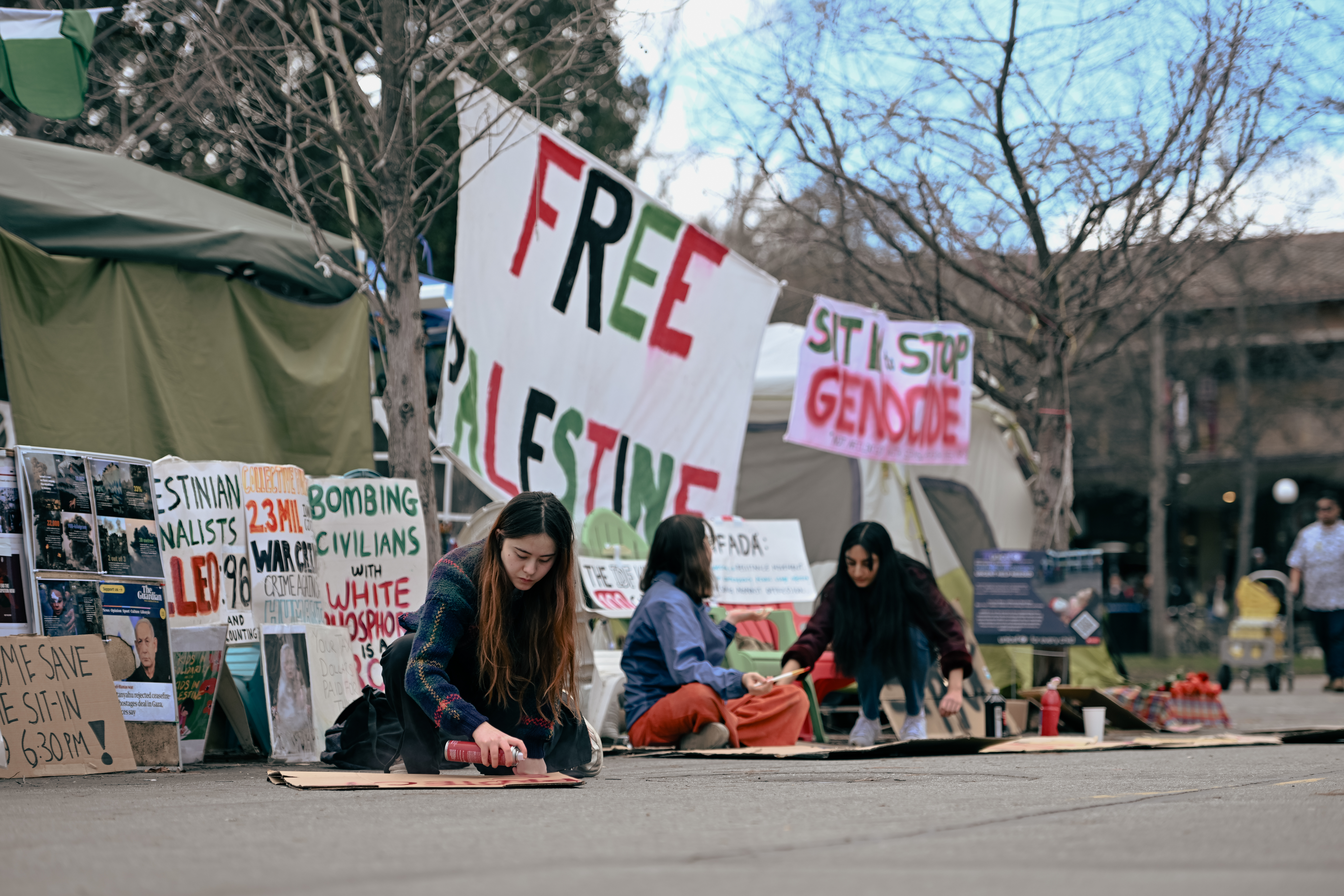The Sit-In to Stop Genocide organized a second emergency rally Monday night, following University demands for the demonstration to cease overnight camping by 8 p.m. or face disciplinary or legal action.
Last Thursday, the Sit-In to Stop Genocide and two other demonstrations — the Blue and White Tent and the newly-established Sit-In to Stop Islamophobia — were mandated by the University to vacate White Plaza between the hours of 8 p.m. and 8 a.m. due to physical safety concerns.
Both the Blue and White Tent and Sit-In to Stop Islamophobia complied by disassembling their demonstrations Thursday evening, but Sit-In to Stop Genocide organizers expressed a commitment to overnight camping until significant progress has been made toward their demands.
On Friday, the University invited sit-in participants to a meeting with President Richard Saller and Provost Jenny Martinez on Monday, as long as they promised to disassemble the sit-in that night at 8 p.m. Sit-in participants requested to extend their “reprieve period” to Friday, Feb. 16 at 8 p.m.
Due to participants’ refusal to cease overnight demonstrations by Monday, the meeting with Saller and Martinez has yet to happen.
“The sit-in has maintained that they are willing to voluntarily end the overnight portion of their activities in exchange for satisfactory progress toward their demands,” said sit-in organizer Hana Spahia ’26.
The University planned to begin submitting the names of students who fail to comply with its mandate to the Office of Community Standards, according to a second letter sent to the sit-in on Saturday. As of 1 a.m. Monday night, no disciplinary action has been taken and there is no evidence that any students’ names have been submitted.
Members of the now-disassembled Blue and White Tent also expressed frustration with the University’s lack of policy enforcement.
“We have been compliant with every order that [the University has] given us because we thought that it was going to be fairly enforced across the board,” said Kevin Feigelis, a seventh-year Ph.D. student in physics and organizer with the Blue and White Tent.
“Instead, we have found that the University never intended to enforce their policies, given those back-channel messages with the sit-in.”
A common thread among participants from multiple demonstrations was frustration with the University’s inconsistent messaging.
Stanford “wants to have people who dissent appropriately, but actually, when people dissent and actually show the reality of the situation [in Gaza] … they’re being targeted, they’re being doxxed,” said a Palestinian protester who requested anonymity due to fear of retaliation.
“I am really just disappointed with the administration … by the way in which they’ve been engaging with students and directing them.”
Beside those demonstrating in support of the sit-in, a group of pro-Israel demonstrators wearing and waving Israeli flags gathered in White Plaza.
David Atri-Schuller, a third-year Ph.D. student, said he showed up to White Plaza to “defend the Jewish state.”
“Most Jews and most Israelis are looking for peace and are looking for a prosperous, thriving Palestinian people,” Atri-Schuller said. “It’s very hard to have that conversation and that nuance when there are massive calls for the destruction of Israel and massive calls for the eradication of the Jewish people from their historic homeland.”
Though Monday’s rally was around half the size of the first emergency mobilization last Thursday, many in attendance said they felt the same sense of urgency.
“The sit-in is hoping that tonight’s turnout will once again demonstrate to the University that this is a cause that students are willing to rally behind. They may try to take down the sit-in, but the fight for Palestinian rights is not over,” Spahia said. “Stanford’s campus will continue to protest … until Stanford meets the sit-in’s demands.”
Participants expressed gratitude for the community they found through the sit-in.
“Regardless of how this ends, I’m really grateful for the sit-in, for the community, for the work we’ve done, the people I’ve met,” said Tobi Bankole ’24, a member of the sit-in. “This has been one of the most rewarding things I’ve done with my time at Stanford.”
